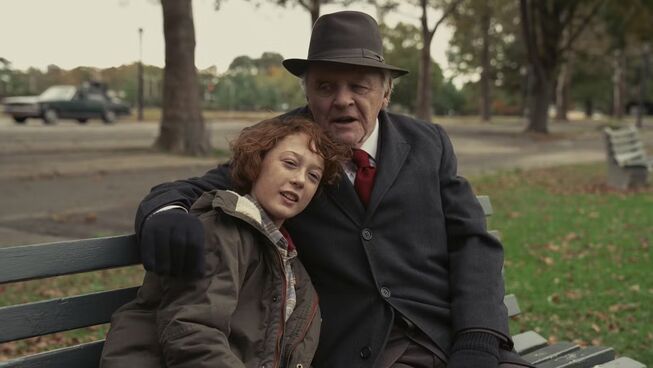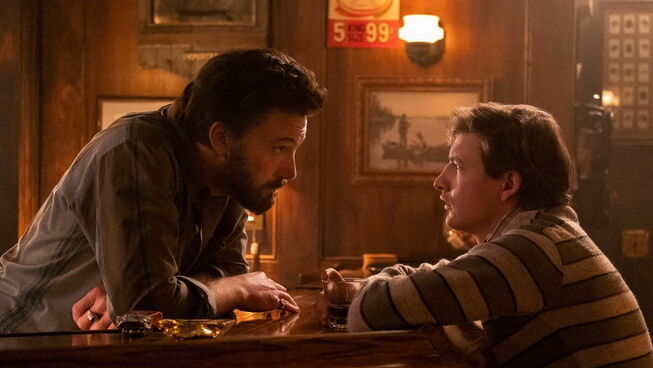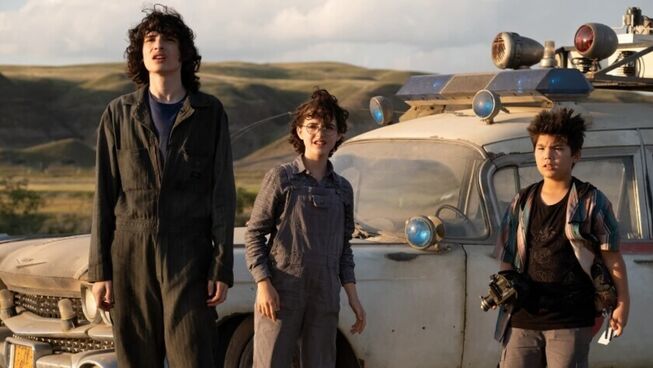
2 out of 5 stars
As a child of the 80s, it is always intriguing to see how someone depicts the era from a biographical point of view. James Grey (Ad Astra) shares a tale of his early teen years and how life in Queens, New York, was changing culturally. This raw glimpse into the director’s past lays bare the racial tensions of that decade. He also allows the audience to wallow in the wounds of a lackadaisical, yet abusive home life while showing the value of multiple generations.
His on-screen persona is named Paul Graff (Banks Repeta), an average student with focusing issues and exceptional artistic talent. As he begins year six, he manages to befriend Johnny (Jaylin Webb), who has repeated the grade and causes their teacher to have a heightened awareness of their antics. The two build a strong friendship, despite being from different cultural backgrounds. Paul’s family is Jewish, while Johnny is African-American and is raised by his infirm grandmother. When the pair get caught smoking cannabis in the school’s restroom, Paul is suddenly sent to his older brother’s private school.
Within the troubled life of this young boy, one constant strength he relies upon is his grandfather, Aaron Rabinowitz (Anthony Hopkins). His presence in Pual’s life allows him to gain wisdom and direction that he does not seem to gain from his parents. Anne Hathaway (Les Misérables) plays his mother, Esther, who has aspirations of leadership in the school where she teaches, but fails to discipline her sons. To compensate for her laissez-faire style of parenting, her husband Irving (Jeremy Strong) punishes the family with an iron fist. An unexpected tyrannical side comes out of him when things do not go as they hoped in their family. It is within this mixture of familial and social tensions that Paul has to determine what path he will choose to walk along in life.
Celebrated and stylised cinematographer Darius Khondji (Uncut Gems) manages to capture the muted tones and visual reality of the early 1980s. He draws the viewer into this era while Grey unflinchingly exposes the ugliness of this era and his own personality. Where many writers and artists would paint themselves as the hero of their own story, he chooses to go down a different path. The writer points to issues within his family life that would be easy for him to blame for his personal choices and failings. Instead his central character is shown to be the least appealing person within the film. The audience is left to wonder if his story arc leads to any significant developmental change.
Notwithstanding, Grey does all he can to throw a line into the political waters as a backdrop to the issues within America’s culture. From Ronald Reagan’s election victory to the influence of Fred (John Diehl) and Maryanne Trump (Jessica Chastain) on his private school. These influences cast less of a shadow on the various shades of his life than the two heroes of his biographical sketch. His grandfather is the moral centre of his life, and his friend Johnny is the unassuming catalyst for his conscience development. Even though the outside world plays a factor in his world, these two personal connections define what the young boy is meant to be within his own story.
Armageddon Time will leave a bitter taste in those who consume this intimate translation of James Grey’s childhood. There is little to celebrate in his personality, life choices, or the visual depiction of the decade, it is meant to represent. Outside of the magnificent performance of Anthony Hopkins as his grandfather, there is not much to enjoy in this journey of historical self-expression.

Reel Marriage
Lights, Camera... Movies and Marriage!
Marriage is one of life’s greatest blessings, yet it faces countless challenges in today’s world. How can we strengthen our commitment and help others see its value? The Bible offers wisdom, but what if movies could serve as a bridge to deeper conversations about love, faith, and commitment?
Reel Marriage explores how film and Scripture can illuminate the beauty of marriage, providing fresh insights into God’s design for love and relationships. From classic romances to modern dramas, movies capture couples' struggles and triumphs, mirroring biblical truths in powerful ways.
Faith and film unite. Are you ready to see marriage in a whole new light?
If you order your copy today you will also receive a complementary handbook that is only available with the purchase of the book (Print or ebook)
REEL DIALOGUE: Multi-generational families
The beautiful connection between a boy and his grandfather is at the core of James Grey's film. No one else seems to be able to connect with the sixth grader, except the man who invests in his grandson and can share his wisdom. In this relationship, the viewer can see the importance of different generations of people investing in our lives.
Grandparents, aunts, uncles, and extended family, represent all that we aspire to be in our lives and those people that are willing to invest in our future. Grandpa Aaron has lived a life filled with joy and pain, but one thing he offers Paul is an accessible hero. Someone to look up to, someone to emulate, and maybe even someone that we envy. This is one of the considerations that the gospel accounts in the Bible address by providing the one and only role model that will not fail.
For the Lord is good; his steadfast love endures forever, and his faithfulness to all generations. Psalm 100:5






